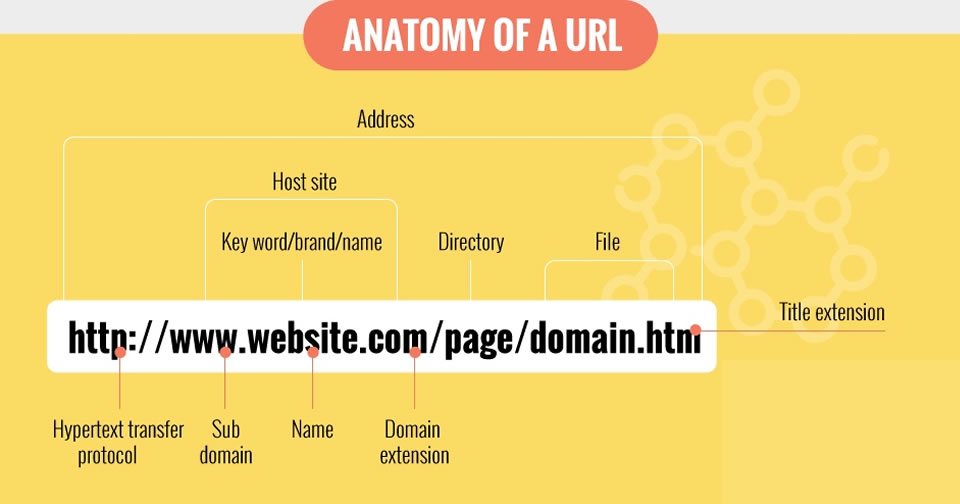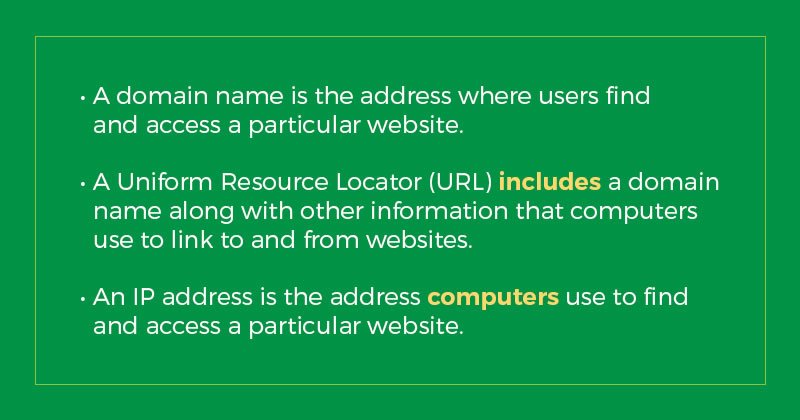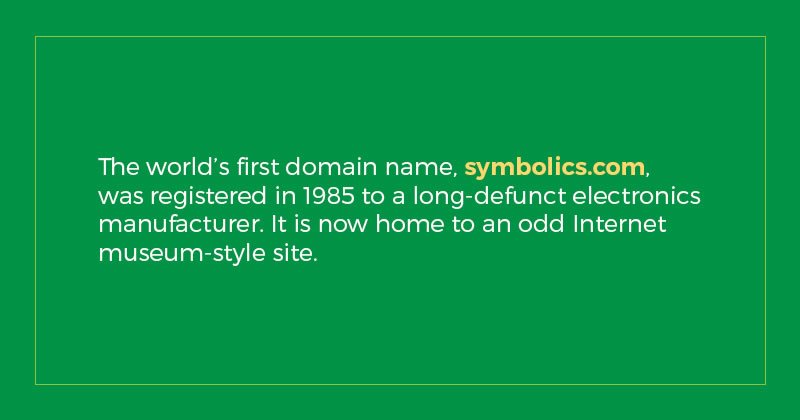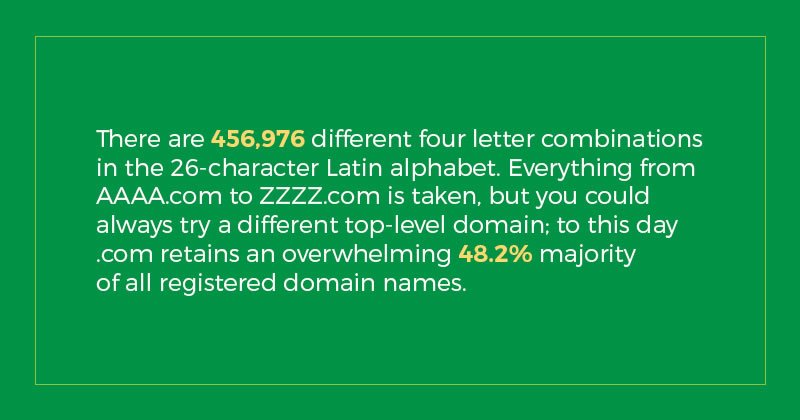What Is A Domain Name? [Infographic]
- David
- February 24th, 2017

Have you ever tried to build a website?
If you’re like most non-technical types, your first try probably stopped cold at the first step: Registering a domain name.
You might have asked yourself questions like, “What is a domain name and how does it work?” “What does domain name mean?” or “How do I register a domain name?”
These are important questions that any Internet user (website entrepreneur or otherwise) should know the answer to.
Read on and we’ll walk you through what a website’s domain name is, why it’s important and what you need to know about it to get your website idea off the ground.
The Building Blocks of the World Wide Web
Unfortunately, website design isn’t taught in most high schools. This is true even though it makes up a $20 billion industry with skyrocketing growth and an increasing presence in every aspect of the average American’s life.
In order to make the Web more accessible, we’re going to cover its basic building blocks and how those fit together with your domain name to create the foundation for your website.
Definitions first: What is the domain name of a website?
A domain name is the address where users find and access a particular website.
For example, our domain name is “WebsiteSpot.com”
You might be thinking, “Isn’t that called a URL? Or an IP address? I’m still confused.”
That’s understandable. Terms like these get thrown around by non-technical people very often, leading to a colloquial shift in meaning—but the Internet is a technical place, and these terms have very specific technical meanings.
For instance, a Uniform Resource Locator (URL) includes a domain name along with other information that computers use to link to and from websites.
An example of a URL would be “https://www.BBQFans.com”
See the difference? Those extra characters are there for a reason.
On the other hand, an IP address is the address computers use to find and access a particular website. It’s a long string of numbers that computers like because they’re very specific, but people don’t because they’re complicated and hard to remember.

Now that we have our definitions straight, we can move on to finding out what domain names do, where they come from and how website owners register them.
What are Domain Names Used For?
The best analogy for understanding the domain name’s function is as a physical address: your house, for instance. Think of the IP address as the GPS coordinates for your home—useful for your satellite TV provider, but not for inviting your folks over on Christmas Eve.
Domain names give websites a sense of ownership. They describe the brand, business or person behind the site in a specific, user-defined way. They follow the regulations set forth by the Domain Name System (DNS), which registers each one and pairs it with the appropriate IP address.
There are two parts to a domain name:
- The name itself—whatever you wish to call your website. This can be any string of letters or numbers that isn’t already registered with the DNS.
- The domain extension—Also called the top-level domain, this is the omnipresent “.com” “.gov” or “.edu” found at the end of every Web address.

You’ll want to keep this in mind when you ask yourself, “what is my domain name going to be?” Once you know, you can move on to the registration process.
Registering a Domain Name
The non-profit agency responsible for regulating the domain name industry is called ICANN, which stands for the Internet Corporation for Assigned Names and Numbers. Only companies that register with ICANN can sell domain names to aspiring website owners. WebsiteSpot.com is one of these domain name registrars, allowing you to register your desired name directly through our Domain Name Search engine.
History of the Domain Name
The Domain Name System greatly expanded the capabilities of the early Internet. Prior to this innovation, commercial use of government communications networks was strictly forbidden. There was thus little need for connectivity beyond the few military and academic systems online at the time.
In 1983, Paul Mockapetris invented the Domain Name System. This decentralized worldwide directory service came with a few generic top-level domain names; two years later, the first domain name was registered.

The first generic top-level domain names were:
- .com for commercial use
- .gov for government agencies
- .edu for academic institutions
- .mil for military organizations
- .net for network infrastructure
- .org for miscellaneous other organizations
Later, country-specific domain extensions joined the group, prompting foreign website owners and operators to register names unique to their locations. Much later, in 2014, more than a hundred new extensions were added, including “.store” and “.cars”, allowing for even more specific domain possibilities.
Why Aren’t Domain Names Free?
Prior to 1995, anyone who wished to register a domain name could do so free of charge. However, increasing public interest in the burgeoning World Wide Web combined with a lack of competition led to commercialization of the registry process.
The first post-1995 domain names registered at a price of $100 for two years. Since then, competition and the greater availability of network infrastructure has dropped the price considerably—nowadays you can register a domain name for about 10-20% of that price.
The privatization of domain name registry made the market more competitive, and in 1998 ICANN was formed to regulate this new market effectively. Without this move towards a regulated free market, the World Wide Web could still be a centralized communications service operated by the government—very few people want that.
21st Century Domain Names
With regulation forthcoming, the early days of the Internet were a bit like the Wild West. Domain names were being registered left and right, websites were popping into and out of existence and the great majority of these pioneers didn’t really understand what domain names were or how they work—but they saw opportunity and acted on it.
In 2003, Senator Orrin Hatch and future Vice President Mike Pence submitted the PROTECT act, which passed Congress and became law that year. This law included the Truth in Domain Names Act, which set forth punishments for misleading or deceptive use of domain names.
As the first years of the new millennium wore on, regulation continued to guide the shape of the Internet towards what we know today. Domain name speculation continued unabated, of course; in 2012 an individual registered 15,000 domain names in a single day, setting a world record. By 2013, every possible four-letter domain name had been registered.

The Profits of Domain Name Speculators
While business owners and prospective Web entrepreneurs are asking themselves what domain names are, enterprising speculators have been registering popular names since the 1990s. The idea that you could simply park a domain name and what for an interested business to pay cash for it is an enticing one.
As of 2017, the most expensive domain name sale in history was for VacationRentals.com, which sold for an astounding $35 million in 2007. Established brands and businesses that need access to a specific domain name are willing to pay top-dollar for the privilege if they have to.
This is why we recommend registering and parking domain names for business ideas even if they aren’t ready to be hosted. Knowing what domain name is best for a particular industry can be enormously profitable all on its own!




